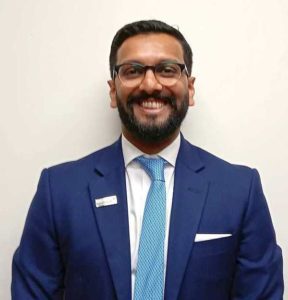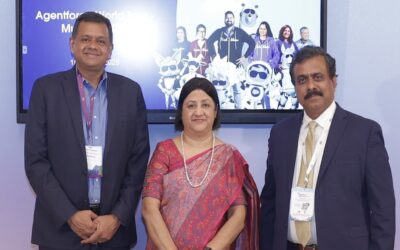The 41-year-old Transworld Group (established in 1977) provides integrated and global logistics around the world. It began as a shipping agency in Mumbai and steadily expanded to become a dynamic shipping and logistics conglomerate. With expertise that covers a complete range of solutions from Ship Owning to Project Logistics to Warehousing, the Group offers world-class logistics and associated services.
Over the years the Group progressed through the supply /value chain. It went from being a shipping agent to a ship owner and operator, and then to a container owner and operator. When it began its operations it was mainly a warehouse owner providing transportation and assistance for documentation needed for customs clearance. Today the organisation is structured in two buckets: ship owning & operations and logistics.
Group expansion led to the formation of multiple companies and today there are 22 entities within the Group. The Group has 1,350 employees (800 on land and 500 on ships) and its goal is to deliver heightened customer satisfaction. It operates in Hong Kong, Singapore, Sri Lanka, India, Pakistan, Bangladesh, UAE, Qatar, Saudi Arabia, and the U.S. It is looking to expand its footprint in Asia.
The Transworld Group is also a part of the global Worldwide 3PL Network. 3PL brings the top local and regional freight forwarders from markets all over the world in a group that provides shippers and exporters with better value and logistics power.

Ritesh S. Ramakrishnan, Joint Managing Director, Transworld Group
Speaking to this writer at Oracle OpenWorld Middle East 2019, in Dubai, Ritesh S. Ramakrishnan, Joint Managing Director, Transworld Group discussed some of the biggest challenges his company faced in the last seven years, towards the integration efforts. The company will complete the last stage of its IT integration project in the third quarter of calendar 2019.
“We have 22 entities within the Group that are using 60 different IT systems that do not talk to each other. This posed a challenge to the Group’s vision of operating as an integrated and holistic global shipping and logistics conglomerate,” said Ramakrishnan.
The IT arm of the Group in Chennai developed custom software for various Group companies and the different functions within the organisation. These applications run on top of Oracle software.
“We have a custom design software on Oracle Forms 11g, which was created 5 – 6 years ago,” informed Ramakrishnan, whose grandfather founded the business. “As we moved forward with the business we realised that there was a serious issue to be addressed for two reasons. One, there were inherent limits to the technology because of its age. Two, the way of looking at technology for us as an organisation has changed. In the past it was support, but today, technology drives the business.”
Transforming for Customer Delight
The Group celebrated its 40th anniversary last year and took on an ambitious project to create an integrated technology platform. After evaluating solutions from different vendors for 6 months, it shortlisted Oracle to provide the technology platform. KPIT (now acquired by Birlasoft) was selected as the implementation partner since it has a lot of experience and expertise in implementing Oracle solutions. The agreement was announced in April 2018.
As part of this agreement, Oracle will provide the cloud-based technology platform that will improve operational efficiency across the Group’s shipping and logistics businesses, and empower its workforce to deliver heightened customer satisfaction to their customers and vendors.
“As we went through the (tendering) process we met several larger companies. However, when we started our discussion with Oracle, we could see the approach and the kind of solutions that they offered. We thought this was the right fit. We saw that Oracle does the integration very well,” said Ramakrishnan.
The project is being implemented in a phased manner and will be completed this year.
“So far we have gone live on some small finance only entities. As we move forward this year we will go live with different entities in different ways. In some cases we will go with finance first, and in others, we will go with operations first. But the final phase will happen in the third quarter of this year,” he said.
According to Ramakrishnan, the entire implementation is now cloud-based (SaaS). Most of the applications will eventually be from Oracle and all applications will be ported to the Oracle Cloud.
“With this SaaS implementation, we will be able to bring in a lot of efficiencies in terms of our data center going on a SaaS model. it will also make our operations a lot easier,” said Ramakrishnan.
Business Challenges
Integrating 60 different IT systems from 22 entities poses a tremendous challenge. But Ramakrishnan knows there are bigger challenges ahead.
“Ours is a 40-year old organisation. There are certain methods and processes ingrained in the organisation and it does take some time to shake out of that. We took a conscious decision to switch the mindset,” he said. “The biggest challenge was having different entities doing parts of the business. The integration for us was the biggest challenge within our own system.”
Change management was another challenge as employees that are used to working on a particular system may not want to switch over to a new one. Luckily this did not pose much of a problem as the Group companies were already using Oracle Financials. They began with Oracle 11g.
“The biggest fear is job loss due to automation and software. But we are very clear that the real reason for doing it is for us to do our business better. And to provide the right information and timely information for the customer and for us internally. It is about driving value to the customer and driving value for the organisation,” said Ramakrishnan.
Right at the outset, Ramakrishnan and his team explained the importance and the urgent need for the integration.

All images are for representation purposes only
The Road Ahead
Apart from a few players such as Maersk Line and DP World, the Shipping industry has been a laggard in terms of technology implementation and understanding the utilisation of technology. The Logistics industry fares better, with many (Indian) startups throwing their hats into the ring, but it still has a long way to go. Startups such as Rivigo, Trukky, BlackBusk, FreightBro are disrupting the Trucking industry in India.
When this project is completed it will put the Transworld Group in the league of the technology savvy shipping and logistics companies.
“We realise that we will need to keep investing in technology. We are an asset business as much as we are a service business. We leverage our assets and our network. Technology is a very critical piece of the business,” said Ramakrishnan.
He has plans for using Blockchain, machine learning and artificial intelligence in a big way.
“We are talking to Oracle for Blockchain, through the Early Adopter Program,” he said. “As a test case, within our organisation, we are looking at something that would allow us to interact with all people in the ecosystem. The idea is to eliminate the documentation and the flow that goes along with it.”
Shipping is a complex ecosystem that involves many entities: customs & documentation, various transporters, different shipping lines, ports & customs on either end; shipping consignees, recipients, container operators, and ships.
Transworld is also considering machine learning, AI, and IoT. It believes the adoption of all these technologies will give better visibility to its internal and external stakeholders.
“We have a lot of moving assets — ships, containers, and trucks. In India we have a fleet of 45 cold chain trucks. The dry truck fleet is closed to 100. We are building some use cases for the cold chain fleet and dry chain — both in the Middle East and India. We are also looking at this for the container business,” said Ramakrishnan.
Technology for Leadership
There is an important lesson to be learned from this story. Here’s a traditional shipping and logistics company that wants to shed its old skin and become a technology company offering services. To be a winner in the game, one has to look beyond assets (like ships and trucks) and invest in new technology. Mindsets, processes and systems need to change too.
Ramakrishnan sums it up well when he says, “Our goal is to be the industry leader when it comes to technology. We want to transform from a shipping company to a technology company. Down the line, we want to be a technology company providing services. The emphasis has to be technology driving business and not business driving technology. For that, you need to have a good backend with robust systems, and build technologies that people want to use. And in using our technologies their stickiness with us increases.”
The writer was invited to Oracle OpenWorld Middle East: Dubai 2019.









